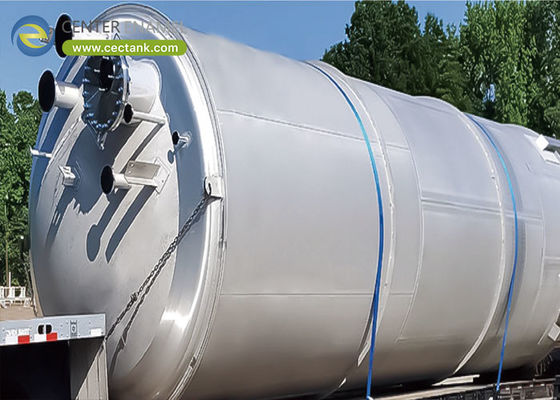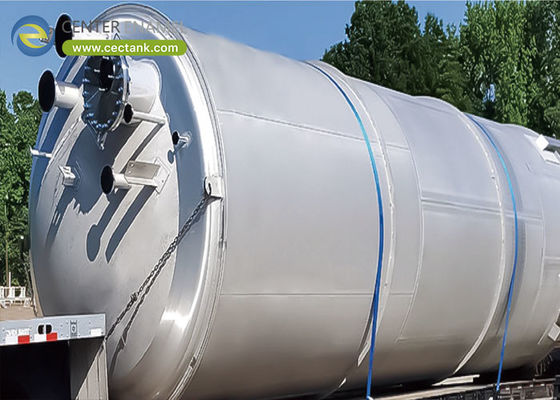-
Glass Fused To Steel Tanks (465)
-
Stainless Steel Tanks (434)
-
Fusion Bonded Epoxy Tanks (469)
-
Galvanized Steel Tanks (321)
-
Aluminum Dome Roofs (1257)
-
Wastewater Storage Tanks (226)
-
Welded Steel Tanks (457)
-
Pressure Vessels (295)
-
Anaerobic Digester (201)
-
Industrial Water Tanks (349)
-
Glass Lined Steel Tanks (180)
-
Bolted Steel Tanks (270)
-
Sludge Storage Tank (115)
-
Biogas Storage Tank (173)
-
Leachate Storage Tanks (133)
-
Agricultural Water Storage Tanks (179)
-
Fire Water Tank (166)
-
Grain Storage Silos (146)
-
Biogas Projects (381)
-
Wastewater Treatment Projects (270)
-
Double Membrane Roof (223)
Engineering Confidence: Designing High-Quality Chemical Pressure Vessels - Materials, Safety, and Performance Standards by Center Enamel
| Place of Origin: | China |
| Brand Name: | Center Enamel |
| Certification: | ISO 9001,CE, NSF/ANSI 61, WRAS, ISO 28765, LFGB, BSCI, ISO 45001 |
| Minimum Order Quantity: | 1 Sets |
| Price: | 2000 |
| Delivery Time: | 2 months |
| Payment Terms: | L/C, T/T |
| Supply Ability: | 200 sets / days |
|
Detail Information |
|||
Product Description
Engineering Confidence: Designing High-Quality Chemical Pressure Vessels - Materials, Safety, and Performance Standards by Center Enamel
In the intricate and often demanding realm of chemical processing, the integrity and reliability of pressure vessels are paramount. These critical pieces of equipment serve as the heart of numerous chemical reactions, separations, and storage processes, handling substances that can range from corrosive and volatile to highly reactive. The design of high-quality chemical pressure vessels demands a meticulous and multi-faceted approach, encompassing careful material selection, stringent adherence to safety protocols, and unwavering compliance with rigorous performance standards. At Shijiazhuang Zhengzhong Technology Co., Ltd (Center Enamel), our decades of experience in designing and fabricating robust storage and containment solutions have equipped us with the expertise to engineer chemical pressure vessels that not only meet but exceed these critical requirements, ensuring operational safety, efficiency, and longevity for our global clientele.
Understanding the complex interplay of factors involved in chemical processing is fundamental to our design philosophy. We recognize that each chemical application presents unique challenges, dictated by the specific properties of the substances being handled, the operating pressures and temperatures, and the surrounding environmental conditions. Our engineering teams leverage cutting-edge design software, advanced material science knowledge, and a deep understanding of international safety and performance standards to create pressure vessels that are fit-for-purpose, reliable, and built to withstand the demanding conditions of the chemical industry.
The Foundation of Integrity: Material Selection in Chemical Pressure Vessels
The selection of appropriate materials is the bedrock upon which the safety and performance of chemical pressure vessels are built. The materials must exhibit exceptional resistance to the corrosive and erosive effects of the chemicals being processed, while also possessing the necessary mechanical strength to withstand the operating pressures and temperatures. Center Enamel employs a rigorous material selection process, considering a wide array of factors:
Chemical Compatibility: This is the most critical aspect. The chosen material must be inert or highly resistant to the specific chemicals it will come into contact with, both internally and externally. This involves a thorough understanding of the chemical's reactivity, concentration, temperature dependence of corrosion rates, and potential for stress corrosion cracking or other forms of material degradation. We consider a range of materials, including various grades of carbon steel, stainless steel (including austenitic, ferritic, and duplex grades), nickel alloys, titanium, and specialized alloys, depending on the specific chemical environment.
Mechanical Strength: The material must possess adequate tensile strength, yield strength, and fatigue resistance to safely withstand the design pressure and any anticipated external loads. Our engineers perform detailed stress analyses to determine the required material strength and thickness, ensuring a robust and safe vessel design. We consider factors such as operating pressure, temperature (which can affect material strength), and potential pressure fluctuations or surges.
Weldability: For fabricated pressure vessels, the chosen material must exhibit good weldability to ensure strong, leak-tight, and corrosion-resistant joints. Our certified welders utilize appropriate welding procedures and consumables compatible with the selected materials. Post-weld heat treatment may be required to relieve stresses and ensure optimal material properties.
Temperature Resistance: Chemical processes often involve a wide range of operating temperatures, from cryogenic conditions to elevated temperatures. The selected material must maintain its mechanical strength and corrosion resistance across the anticipated temperature range. We consider factors such as thermal expansion and potential for brittle fracture at low temperatures or creep at high temperatures.
Cost-Effectiveness: While safety and performance are paramount, cost-effectiveness is also a consideration. We strive to select materials that offer the optimal balance of performance, longevity, and cost, taking into account the overall lifecycle cost of the vessel, including material costs, fabrication costs, and potential maintenance costs.
Regulatory Compliance: Material selection must also comply with relevant industry codes and standards, such as ASME Boiler and Pressure Vessel Code, PED (Pressure Equipment Directive), and other regional or international regulations.
Ensuring Operational Integrity: Safety Standards in Chemical Pressure Vessel Design
Safety is non-negotiable in the design and operation of chemical pressure vessels. A failure can have catastrophic consequences, leading to loss of life, environmental damage, and significant economic losses. Center Enamel adheres to the most stringent safety standards throughout the design process:
Design Codes and Standards: We meticulously follow recognized international design codes and standards, such as the ASME Boiler and Pressure Vessel Code (Section VIII, Divisions 1, 2, and 3), the European Pressure Equipment Directive (PED), and other relevant regional standards. These codes provide comprehensive guidelines for the design, fabrication, inspection, and testing of pressure vessels, ensuring a high level of safety.
Pressure Relief Systems: All our chemical pressure vessels are equipped with appropriate pressure relief devices, such as safety valves or rupture discs, designed to prevent over-pressurization beyond the vessel's design limits. The sizing and selection of these devices are based on potential overpressure scenarios, including blocked outlets, external fire, and control system failures.
Non-Destructive Testing (NDT): Throughout the fabrication process, we employ various NDT methods, such as radiographic testing (RT), ultrasonic testing (UT), magnetic particle testing (MT), and liquid penetrant testing (PT), to ensure the integrity of welds and the base material. These tests help detect any flaws or discontinuities that could compromise the vessel's structural integrity.
Hydrostatic Testing: Upon completion of fabrication, all pressure vessels undergo hydrostatic testing at a pressure significantly higher than the design pressure to verify their structural integrity and leak-tightness. This crucial test provides a final confirmation of the vessel's ability to safely withstand operating pressures.
Risk Assessment and Hazard Analysis: For complex chemical processes, we conduct thorough risk assessments and hazard analyses (such as HAZOP studies) to identify potential hazards and incorporate appropriate safety features into the vessel design and the overall system.
Ergonomics and Accessibility: Our designs consider ease of operation, inspection, and maintenance, incorporating features such as strategically placed manways, nozzles, and access platforms to ensure safe and efficient access for personnel.
Emergency Shutdown Systems (ESD): Where applicable, our pressure vessel designs are integrated with emergency shutdown systems to quickly and safely isolate the vessel in the event of an abnormal operating condition.
Delivering Reliable Performance: Performance Standards for Chemical Pressure Vessels
Beyond safety, high-quality chemical pressure vessels must also deliver reliable and efficient performance throughout their operational lifespan. Center Enamel designs its vessels to meet stringent performance standards:
Design Pressure and Temperature: Our vessels are designed to safely operate at the specified design pressure and temperature, taking into account potential fluctuations and ensuring adequate safety margins.
Corrosion Allowance: We incorporate a corrosion allowance into the vessel wall thickness to account for anticipated material loss due to corrosion over the vessel's design life. This allowance is determined based on the corrosivity of the chemicals being handled and the expected operating conditions.
Flow Characteristics: For vessels involved in chemical reactions or separations, we consider flow characteristics and internal baffling or distributor designs to optimize mixing, heat transfer, and reaction kinetics.
Heat Transfer Efficiency: For vessels with heating or cooling requirements, we design appropriate heat transfer surfaces, such as jackets or internal coils, to ensure efficient and controlled temperature regulation.
Leak Prevention: Our fabrication and testing procedures are designed to ensure leak-tight performance, preventing the loss of valuable or hazardous chemicals and minimizing environmental impact.
Ease of Maintenance: We design our vessels with consideration for ease of inspection, cleaning, and repair, minimizing downtime and maximizing operational availability.
Long Service Life: By employing robust materials, adhering to stringent design and fabrication standards, and incorporating appropriate corrosion protection measures, we aim to provide chemical pressure vessels with a long and reliable service life, minimizing the total cost of ownership.
Center Enamel's Commitment to Excellence in Chemical Pressure Vessels:
At Center Enamel, our commitment to designing and fabricating high-quality chemical pressure vessels is unwavering. We combine our extensive experience, advanced engineering capabilities, and a deep understanding of the chemical industry's unique demands to deliver solutions that inspire confidence. Our approach encompasses:
Expert Engineering Team: Our team of highly qualified engineers possesses in-depth knowledge of material science, structural analysis, and relevant design codes and standards.
Stringent Quality Control: Our comprehensive quality control program covers all aspects of the manufacturing process, from material procurement to final testing and inspection.
Customization Capabilities: We work closely with our clients to understand their specific process requirements and provide tailored pressure vessel designs that meet their unique needs.
Global Support and Service: Our commitment extends beyond the sale, with comprehensive support and service available to our clients worldwide.
Engineering Confidence for the Chemical Industry:
The design and fabrication of high-quality chemical pressure vessels are critical to the safety, efficiency, and sustainability of the chemical processing industry. By prioritizing meticulous material selection, adhering to stringent safety standards, and ensuring reliable performance, Center Enamel engineers and manufactures pressure vessels that our clients can trust. Our dedication to excellence empowers the chemical industry to operate with confidence, knowing that their critical processes are contained within vessels designed and built to the highest standards of integrity and reliability. Contact Center Enamel today to discuss your chemical pressure vessel requirements and experience the assurance of engineered confidence.




